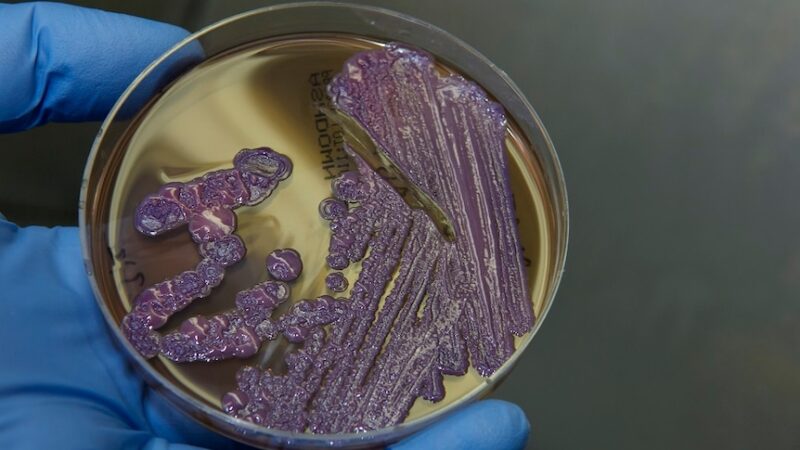Scientists make promising breakthrough against bacteria that attacks Australian ICU patients

Scientists are hopeful that they have discovered a new class of antibiotic that could effectively kill off one of the world’s most drug-resistant bacteria.
Key points:
- The antibiotic targets a molecule in a drug-resistant bacteria’s cell walls
- The research is in its early stages and yet to reach clinical trials
- In Australia, the bug most commonly causes dangerous infections in ICU wards
Acinetobacter baumannii topped the World Health Organization’s list of 12 superbugs for which new antibiotics are “urgently needed” in 2017.
The European researchers managed to use the drug to successfully target the bug in mice, according to a study published this week in the scientific journal, Nature.
The development could be huge — according to the study, it’s been 50 years since a new antibiotic has been released to counter the pathogen.
“This is another important breakthrough,” said Professor John Turnidge, who leads Australia’s national surveillance of antimicrobial resistance and antibiotic usage.
“I think we are now starting to see emerge some very interesting new drugs, particularly ones that are targeted at the most resistant organisms that we have to manage.”
But there’s still a long way to go before it’s a reality.
How does it work?
In Australia, Acinetobacter baumannii was behind more than 2,000 cases of infection in 2021, according to the Australian Commission on Safety and Quality in Health Care.
“It’s one that attacks people most often in intensive care units, who’ve got tubes down their necks to help them breathe and it can cause a rather aggressive form of pneumonia and kill you,” Professor Turnidge said.
The bug can be disastrous when it spreads.
“The problem that we’re all fearful of, and it has happened from time to time in Australia, is that the bug gets into patients in intensive care and then remains there hidden sometimes and jumping into other patients for weeks and sometimes months on end,” he said.
“So once it gets resistant and starts spreading to other patients, it can be very difficult to get on top of.”
Acinetobacter baumannii is a gram-negative bacteria, meaning it has an extra layer outside its cell wall.
“That means that a lot of common antibiotics don’t actually touch them,” Professor Turnidge said.
The researchers, from the Swiss health care company Hoffmann-La Roche and Harvard University, say the new antibiotic called Zosurabalpin, kills Acinetobacter baumannii by targeting a molecule required to strengthen that extra layer.
How significant is the study?
ANU infectious disease specialist Professor Peter Collignon said the initial results of the study represented a promising development against a pathogen already causing problems in Australia’s health system.
“Acinetobacter is a very difficult bacteria to treat that causes serious infections worldwide, but in Australia, in the intensive care units and people who’ve had leukaemia for instance, there’s not a lot of options for antibiotics,” he said.
But he cautioned that researchers are still a long way off proving it can be effectively used in humans.
“They’ve really only done laboratory testing on bacteria and some early experiments in mice, so even higher animals such as monkeys and dogs and cats haven’t been tested against yet, and we haven’t got any data in people.
“I would think at the minimum it’d be five years at least before we even see this available on an even experimental basis in people.
“So there’s a lot more work that needs to be done.”
Why does it matter?
Australia has a much higher rate of antibiotic use than comparable countries, and there are fears drug-resistant infection could become a big problem in the future.
“We have some resistances that are a current problem, we have some resistances that haven’t taken off yet, but they’re all there ready to pounce,” Professor Turnidge said.
“And the more antibiotics that we use, especially out in the community rather than in hospital, the more trouble we will eventually have because it’ll mean so many different people across Australia will have acquired bugs that are resistant to multiple antibiotics.”
Professor Collignon said the Swiss development was a positive step forward in a field that has not seen the development of a significant new class of drug since 1987.
“The reason for that is there’s just not the reward in developing antibiotics. Antibiotics are almost the only drug when you take it for a week, it cures the problem … so there’s not the return for pharmaceutical companies to go into these sort of drugs.
“But by the same token, much more expensive drugs like anti-cancer drugs, they won’t be able to be very useful at all either if you don’t have antibiotics to treat the inevitable infections that occur if complications this time.”
He said while infection control and good hygiene were key to slowing down antibiotic resistance, developing new classes of drugs was all important.
“So this is promising because this does appear to be a completely new class of drug against gram-negative bacteria … particularly Acinetobacter, which is one of the more aggressive bugs that cause this problem worldwide,” he said.
Loading…








